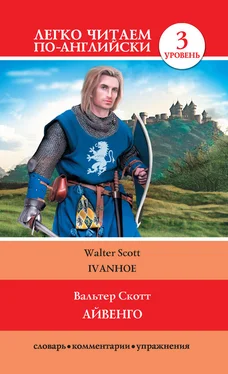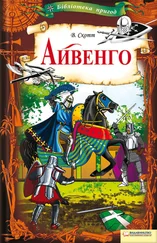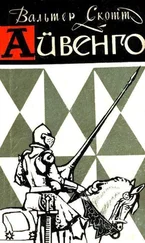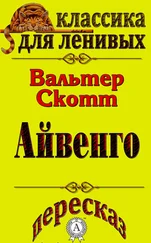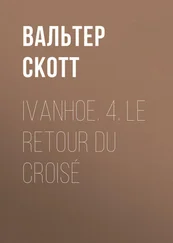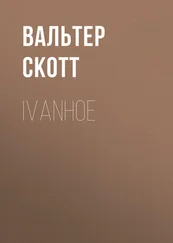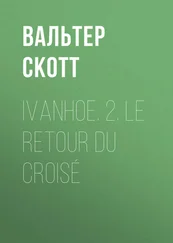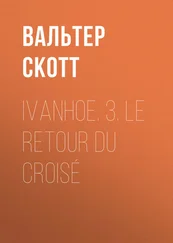Several witnesses described how Bois-Guilbert risked his own life to save Rebecca and the manner in which Bois-Guilbert and Rebecca arrived at the Preceptory.
“Let us now hear somebody talk about the life of this woman, brothers,” said the Grand Master.
There was in the crowd a man who really was cured by Rebecca. He told that some time ago he suddenly fell ill, while he was working for Isaac of York. He couldn’t move his arms or his leg, until Rebecca’s treatment helped him. He was not perfectly cured, but he could work. Rebecca even gave him a pot of her warming and spicy-smelling balsam and some money to return to the house of his father.
“Stupid peasant, who plays with magic, do you have this balsam with you?” asked the Grand Master.
The peasant took out a small box. The Grand Master asked if there was a doctor who could tell him the ingredients of this mystic balsam. Two doctors, as they called themselves, the one a monk, the other a barber, appeared, and swore they knew nothing of the materials, except that they smelled like Eastern herbs. But with the true professional hatred to a successful competitor, they said that, since the medicine was beyond their own knowledge, it was magical. When this medical research was ended, the Saxon peasant asked humbly to have back his medicine, but the Grand Master frowned and said, “What is your name, fellow?”
“Higg, the son of Snell,” answered the peasant.
“Then Higg, son of Snell,” said the Grand Master, “I tell you it is better to be paralyzed than to accept the help of unbelievers’ medicine.”
At this period of the trial, the Grand Master commanded Rebecca to unveil herself. “I will obey you,” she replied, with an expression of patient sorrow in her voice, which had almost melted the heart of Beaumanoir himself; “at your command I will show the face of an unfortunate maiden.”
Higg, the son of Snell, cried:
“Let me go! I cannot look at her and think that I have helped to kill her!”
“Poor man,” said Rebecca, when she heard his exclamation; “you have done me no harm by speaking the truth—you cannot help me by your complaints, go home and save yourself.”
Higg calmed down and was allowed to stay.
Then the Grand Master listened to two soldiers, who were bribed by Albert Malvoisin to make sure Rebecca dies and Bois-Guilbert is free to follow the road of ambition. Their evidence was this: Rebecca was heard to mutter to herself in an unknown language; one of them had seen her cure a wounded man in the castle of Torquilstone by making signs upon the wound and repeating mysterious words, after which the iron head of an arrow came out of the wound, the wound was closed, and the dying man was ready to fight again. To show that his story was true, he took out of his bag the head of an arrow, which, according to his story, had come out of the wound. The second soldier had been a witness to the scene between Rebecca and Bois-Guilbert, when she was standing on the parapet threatening to throw herself down. Not to be behind his companion, this fellow said that he saw Rebecca turn into a swan, flying around the tower three times and then turning into a woman again. This was enough to prove Rebecca guilty. The Grand Master asked what she could say in reply.
“To ask for pity,” said the lovely Jewish woman, with a voice trembling a little with emotion, “would, I know, be useless. To say that to help the sick and wounded of another religion cannot be bad in the eyes of God wouldn’t help either. But I will ask Brian de Bois-Guilbert himself, are not these accusations as false as they are deadly?”
There was a pause, all eyes turned to Brain de Bois-Guilbert. He was silent.
“Answer her, brother,” said the Grand Master, “if the enemy with whom you are fighting gives you power.”
Bois-Guilbert seemed agitated by opposite passions, which almost convulsed his features. He said in a strange tone, looking at Rebecca, – ”The scroll! – the scroll!”
“Yes,” said Beaumanoir, “this is indeed evidence! The victim of her magic can only tell us about the fatal scroll, the spell written on which is, doubtless, the cause of his silence.”
But Rebecca understood the knight correctly and quickly read the small scroll in her hand. The scroll said: “Demand a Champion!”
“Rebecca, the evidence of this knight doesn’t help you. Do you have anything else to say?”
“There is one chance of life left to me,” said Rebecca, “by your laws, I maintain my innocence, and I declare the falsehood of this accusation—I demand the privilege of trial by combat, and will appear by my champion.”
“And who, Rebecca,” replied the Grand Master, “will fight for a Jewish maiden?”
“God will give me a champion,” said Rebecca.
* * *
Even Lucas Beaumanoir himself was impressed by Rebecca’s defense.
After some time he spoke: “Maiden, I feel pity for you. Repent, my daughter, confess your sins, accept our true faith and live. What has the law of Moses done for you that you will die for it?”
“It was the law of my fathers,” said Rebecca, “it was given upon the mountain of Sinai in cloud and in fire. I am just a woman and I am not prepared to defend my religion, but I can die for it, if it is God’s will.”
“Do you refuse to confess your guilt and insist on your bold challenge?”
“I do, noble sir,” answered Rebecca.
“So be it then, in the name of Heaven,” said the Grand Master, “and may God show the right!”
“Amen,” replied the Preceptors around him.
“Brothers,” said Beaumanoir, “Who should be our champion in the field?”
“Brian de Bois-Guilbert,” said one of the Preceptors.
“So be it!” exclaimed the Grand Master, “Rebecca, we give you three days to find a champion. And if you can’t find one, or your champion is defeated, you will die the death of a witch.”
“God’s will be done!” said Rebecca, “I only need someone to carry my message to my father.”
There was another pause, then Higg, the son of Snell, replied, “I am still a sick man, but I can I will carry your message.”
“Find Isaac of York,” said Rebecca, “here is money for the road—let him have this scroll. Farewell! Life and death are in your haste.”
The peasant took the scroll, which contained only a few lines in Hebrew and left.
Higg didn’t have to go to York, however, because not far from the gate of the Preceptory he met with two riders. And when he approached them he discovered that one of them was his old employer, Isaac of York.
When Isaac read the scroll, he fell from his mule like a dying man.
“Child of my sorrow,” cried the poor Jew, “I cannot live without you! Child of my love! – child of my old age! – oh, Rebecca, daughter of Rachel!”
“Pull yourself together,” said his friend, “go and look for a champion. Find Wilfred, the son of Cedric. It may be he will help you with advice or will fight himself.”
“I will find him,” said Isaac, “because he is a good man, and has compassion for the Jews. And brother, Heaven be praised that gave me a friend in my misery!”
They hugged and went in different directions, leaving the crippled peasant alone.
* * *
When the Black Knight left the generous bandit, he went to the monastery where the wounded Ivanhoe had been removed from the castle. On the next morning the Black Knight was ready to continue his journey accompanied by the jester Wamba, who was his guide. Ivanhoe watched his departure from the monastery.
But some hours later he requested to see the Prior. The old man came in haste, and asked anxiously about the state of his health.
Читать дальше
Конец ознакомительного отрывка
Купить книгу
